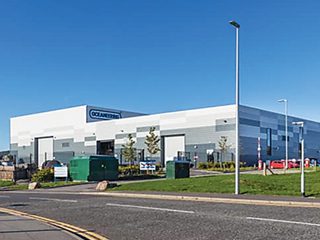
Institute News
The Institute of Corrosion is very pleased to welcome its newest corporate member, Oceaneering International (OI), a global provider of engineered services and products, primarily to the offshore energy industry, including renewables. Many Oceaneering employees are already ICorr members who have long supported our branch activities. Its Integrity Management and Digital Solutions (IMDS) group combines the strength of our asset integrity segment and our global data solutions business to optimise digital and software solutions for our integrity management services. Oceaneering has long delivered safe, agile, integrated project execution and integrity management across the asset life cycle, across a range of facilities and industries, onshore and offshore.
From remote inspection to capturing and managing data more effectively, Oceaneering offers a range of integrity solutions that optimise inspection and maintenance regimes to deliver significant time and cost savings.
With nearly 60 years of experience in underwater and harsh environments, Oceaneering is committed to advancing technologies that ensure the safety of the people and places where we live and work, and to reduce the carbon footprint of our operations and those of our customers, applying its core capabilities to the offshore energy, defence, aerospace, manufacturing, logistics, science and research, and also the entertainment industries.
CAPTIONS:

Oceaneering – New Aberdeen Support Facility and Warehouse.
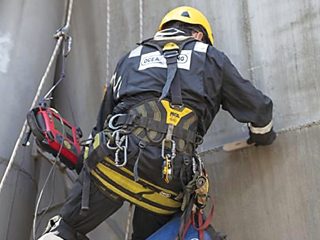
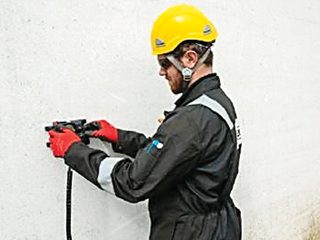
Oceaneering – advanced NDT and rope access-based inspection services.
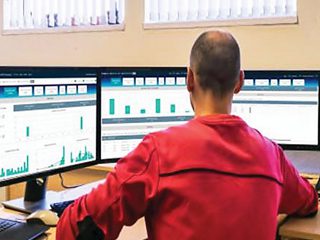
Oceaneering – IMDS services.
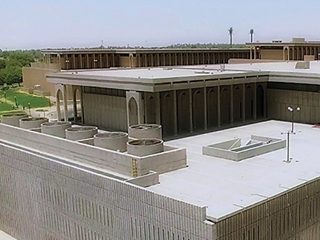
Institute News
During the last few months, the Institute has been very pleased to welcome the following new overseas and UK student members and we wish them all success in their future careers and ICorr journey.
• Ali Haider – University of Punjab – 02 July 2023.
• Ibrahim Alhajji – King Fahd University of Petroleum and Minerals – 03 July 2023.
• Leandro Liveira – University of Sao Paulo – 03 July 2023.
• Saif Ramy – University of Leeds – 11 July 2023.
• Srivatsava Podicheti – Institute of Aeronautical Engineering (Hyderabad) – 08 August 2023.
• Nedson Kashaija – Eotvos Lorand University (Budapest) – 25 August 2023.
• Nikhil Rahul Dhongde – Indian
Institute of Technology (Guwahati) – 04 September 2023.
• Abhishek Rao – Indian Institute of Engineering Science and Technology (West Bengal) – 11 September 2023.
• Oloche Job Ibrahim – UTM: Universiti Teknologi (Malaysia) – 13 September 2023.
• Tirmizhi Munkaila Abubakar – UTM: Universiti Teknologi (Malaysia) – 14 September 2023.
• Chandra Mouli – Thiruvallur University (Tamil) – 03 October 2023.
• Ignatius Darkwa Asamoah – University of Ghana – 03 October 2023.
• Chaouchi Houmam Abdelhamid – UMBB: Université M’Hamed Bougara Boumerdès (Algeria) –
23 October 2023.
The Institute welcomes New Student members with a keen interest in Corrosion prevention matters to join us, (membership is free during period of studies).
Please see: www.icorr.org/free-student-membership/
CAPTIONS:

King Fahd University (Saudi Arabia)
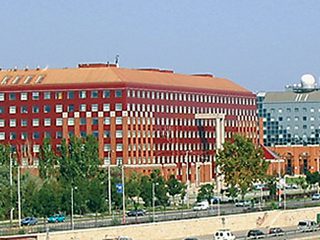
ELU Eotvos Lorand University (Hungary)
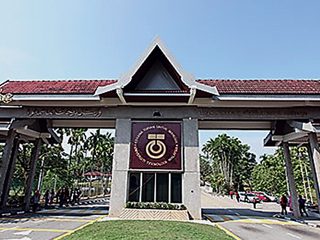
UTM: Universiti Teknologi (Malaysia)
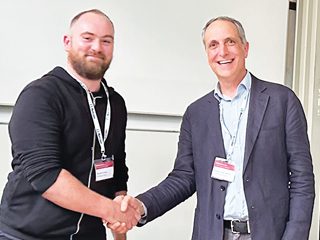
Uncategorized
The 64th Corrosion Science Symposium (CSS) was held jointly with Electrochem 2023 at the University of Bristol between September 10 and 12, 2023. The CSS has been held annually since its launch in 1960 by Prof. L.L. Shreir. The symposium is always an ideal opportunity for students and early career researchers in corrosion science from across the UK and Europe to congregate, discuss their work, share ideas, and, above all, enjoy themselves in a stimulating and friendly environment. This year, there were 20 talks and seven posters, and the UR Evans award plenary talk was given by Prof.
Nick Birbilis (Deakin University, Australia).
The Shreir Prize for the best student presentation went to James Rafferty (University of Manchester) for his talk entitled Environmental effects of a simulated AGR coolant on oxidation and carburization behaviour of type 316H stainless steel. His talk eloquently described the environmental effects of oxidation and carburisation of type 316H stainless steel, which is used within the super-heater and re-heater sections of the UK’s Advanced Gas-cooled Reactors. The effects of gas pressure, water vapour content, and applied stress on oxidation and carburisation were investigated. Unlike other studies, no significant changes in oxidation or carburisation as a function of water vapour in the gas were explored with the development of some critical insights and understanding.
Other symposium highlights included: Lawrence Coghlan (University of Manchester) gave an interesting overview of his work on the degradation mechanism of polyester powder coatings exposed to cyclic corrosion testing. In an effort to better understand the mechanism of crack initiation and subsequent degradation of coatings, powder-coated samples were exposed to cyclic corrosion testing experiments of various lengths to characterise the formation and subsequent development of defects within the coating. These defects and the development of cracks were linked with microstructural features within the coating and the substrate surface to better understand the mechanism of initiation and propagation. Amber Sykes (University of Leeds) reported her studies into the influence of CO2 partial pressures on the formation and protective characteristics of iron carbonate corrosion products. Specifically, under certain conditions, the precipitation of FeCO3 corrosion products on pipe walls can form a dense layer that protects the underlying X65 carbon steel from further corrosion. However, the level of protection offered by the corrosion product layer is highly sensitive to changes in environmental conditions. Amber used electrochemical tests to demonstrate how distinct FeCO3 layers develop and revealed how operating pressure affects FeCO3 formation rates.
Finally, one of the four poster prizes awarded by the Electrochem 2023 meeting was presented to Hector Arriba Gutierrez (Cranfield University) for his work on the SS Great Britain: Decarbonising the Unique Conservation System for the World’s First Iron Ship.
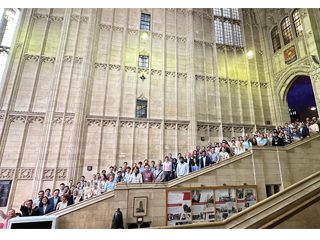
Electrochem 2023 and Corrosion Science Symposium (CSS) delegates

Shreir prize recipient (James Rafferty) and CSD Chair
Julian Wharton.
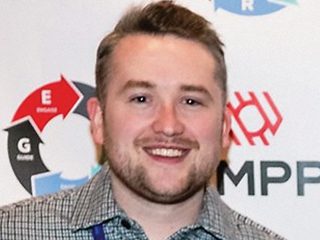
Institute News
The Fourth of the Series of YEP-AMPP Journals, by Lee Hunter, Newly Promoted to Commercial Manager at AIM Group
Introduction
I recently had the opportunity to attend the EMERG Leadership programme and the AMPP conference in Denver, Colorado, representing the Institute of Corrosion. Being a part of the successful team for the Young Engineer Program 2023, which was sponsored by bp and was given the incredible opportunity to attend these events.
The EMERG Leadership programme provided me with an excellent platform to enhance my leadership skills and knowledge, and I had the opportunity to interact with other industry leaders and professionals. The AMPP conference was also an incredible experience, where I gained valuable insights into the latest trends and innovations in the corrosion and asset integrity industry.
As a result of my participation in the programme, I was able to network with industry leaders and gain a deeper understanding of the challenges and opportunities facing the coatings and corrosion industry. This experience has been invaluable in my professional development, and I was excited to continue my learning journey by attending the AMPP Conference and connecting with like-minded professionals in the industry.
EMERG Leadership Training
As an emerging leader myself in the field of coatings and corrosion, I was thrilled to attend the EMERG leadership programme.
One of the highlights of the session was the opportunity to connect with other emerging leaders in the industry. We were divided into small groups to discuss our own experiences with emotional intelligence and to share strategies for developing our skills. It was inspiring to hear from others about their challenges and successes in developing their emotional intelligence, and I felt energised and motivated by the shared sense of purpose and dedication to leadership development.
EMERG provided valuable insights into the practical skills and traits necessary for effective leadership in the coatings and corrosion industry. The emphasis on emotional intelligence was particularly valuable, as it highlighted the importance of self-awareness, empathy, and effective communication in building strong relationships with others. I left the session feeling more confident and better equipped to lead my team towards success, and I am grateful for the opportunity to learn from and connect with other emerging leaders in the industry.
AMPP Conference Denver
Day 1
I then had the pleasure of attending the AMPP (Association for Materials Protection and Performance) conference in Denver, and I must say it was an eye-opening experience. The conference brought together professionals from various fields, including corrosion and coatings, to discuss the latest advancements in the industry.
On the first day of the conference, I attended a Coatings 101 seminar.
During the seminar, we learned about the importance of coatings in protecting metals from corrosion, wear and tear, and other environmental factors that can damage their surfaces. We also learned about the various testing methods used to evaluate the performance of coatings, including visual inspections, electrochemical impedance spectroscopy, and Fourier transform infrared spectroscopy.
After the Coatings 101 seminar, I attended an interactive workshop that was an excellent opportunity for me to learn about the different types of coating inspection instruments available and their uses in the industry. We discussed the importance of using the correct instrument for a particular coating, as different coatings require different inspection methods. For example, adhesion testers are used to evaluate the adhesion of coatings to substrates, while surface profile gauges are used to measure the roughness of a surface. Overall, the first day of the AMPP conference was an excellent start to the event. The Coatings 101 seminar and the interactive workshop on coating inspection instruments provided me with a solid foundation of knowledge on coatings, their applications, and testing methods. I left the event feeling inspired and eager to learn more about the coatings industry.
Day 2
On day two of the conference, I had the opportunity to attend a series of informative seminars and attend the opening ceremony of the exhibitor hall. Here is a summary of my experience: The first seminar I attended on day two was on corrosion under insulation (CUI).
During the seminar, I learned about the various factors that contribute to CUI, including the type of insulation used, the operating temperature of the equipment, and the presence of moisture. We discussed how to identify and assess the severity of CUI, as well as the different methods of preventing and mitigating it, including protective coatings and insulation removal and replacement.
Next, I attended a seminar on materials and the cost of corrosion. The seminar focused on the economic impact of corrosion on industry, the different types of corrosion-resistant materials available, and how to select the right material for a particular application. The seminar was led by a materials expert who provided valuable insights into the selection and specification of materials in industry.
After attending the seminars, I made my way to the exhibition hall opening ceremony. The exhibition hall was filled with representatives from coatings and corrosion companies, equipment manufacturers, and service providers, all showcasing their latest products and services. I was impressed by the diversity of the exhibitors and the range of products and services they offered. From coatings and corrosion protection solutions to equipment and instrumentation, the exhibitor hall had something for everyone. I had the opportunity to speak with representatives from various companies and learn about their latest products and services. I also networked with other attendees and exchanged ideas and experiences with them.
Day 3
On the third day of the AMPP conference, I attended several seminars covering a range of topics related to coatings and corrosion. Here’s a recap of my experience: The first seminar I attended was on selecting and managing coating inspectors. The seminar focused on the importance of selecting the right inspector for a particular job, and the key qualities to look for in a coating inspector. The seminar was led by an experienced inspector who shared his insights on the selection and management of coating inspectors.
During the seminar, we learned about the different types of coating inspectors, including AMPP-certified inspectors, and the various criteria that should be considered when selecting an inspector, such as experience, qualifications, and availability. We also discussed the importance of effective communication between the inspector and other stakeholders, such as the contractor and the client.
The second seminar I attended was on the implementation of a corrosion management system in a gold mine based within the Arctic Circle. The seminar focused on the unique challenges of implementing a corrosion management system in a harsh, remote environment, and the strategies and best practices for overcoming these challenges. The seminar was led by a corrosion expert who shared his experiences and insights on the successful implementation of a corrosion management system. The final seminar I attended was on marine coatings and corrosion. The seminar focused on the challenges of protecting marine structures and vessels from corrosion, and the various types of coatings and protection systems available. The seminar was led by a coatings expert who shared his experiences and insights on marine coatings and corrosion protection.
During the seminar, we learned about the various types of marine structures and vessels, and the specific challenges they face in terms of corrosion. We also discussed the different types of coatings and protection systems available, including anti-fouling coatings, cathodic protection, and sacrificial anodes. The seminar provided valuable insights into the selection and application of coatings and protection systems for marine applications.
Awards Ceremony I had the pleasure of attending the EMERG scholarship awards ceremony during the conference, where my fellow ICorr YEP 2022 winners and I were presented with awards for winning the program. It was an incredible experience to be recognised for our efforts and achievements in the coatings and corrosion industry. I was also thrilled to see other award winners being recognised for their significant achievements in their respective fields of study.
The event was only made possible by the generous sponsorship of bp, and I am grateful for their support in recognising the hard work and dedication of emerging professionals in the industry. The evening of entertainment and networking that followed the ceremony was a great opportunity to connect with like-minded professionals and learn from their experiences. Overall, it was a truly memorable event, and I feel privileged to have been a part of it.
Day 4
On the fourth and final day of the AMPP conference, I attended two seminars covering a range of topics related to coatings and corrosion.
Here is a recap of my experience:
During the seminar, we learned about the specific challenges faced by the pipeline due to the presence of the HVDC power line, including interference with the pipeline’s cathodic protection system. We also discussed the various field-testing procedures that can be used to evaluate the effectiveness of the cathodic protection system, including potential measurements and current density mapping. The seminar provided valuable insights into the practical aspects of field testing on a metallic pipeline collocated with a HVDC power line.
The second seminar I attended was on finding the smoking gun: lessons learned from a HDD coating challenge. The seminar focused on a case study involving a horizontal directional drilling (HDD) project, where a coating failure occurred, and the lessons learned from this challenge.
The seminar was led by a coatings expert who shared his experiences and insights on coating failures and the importance of identifying the root cause.
During the seminar, we learned about the specific challenges faced by the HDD project, including the difficulty of coating the pipeline in a challenging environment. We also discussed the various factors that can contribute to coating failures, such as poor surface preparation, inadequate application procedures, and environmental factors. The seminar provided valuable insights into the importance of identifying the root cause of a coating failure, and the strategies and best practices for preventing similar failures in the future.
Overall, I left the conference feeling greatly inspired and motivated to apply the knowledge and insights I had gained to my work, and I look forward to attending future AMPP conferences.
Links:
The Young Engineer Programme 2024
INSTITUTE OF CORROSION – For details of the 2024 YEP Programme.
EMERG Student Outreach Program – AMPP
https://ace.ampp.org/about
AMPP: Association for Materials Protection and Performance
https://www.aimgrp.co.uk/

Lee Hunter Commercial Manager at AIM Group – Providing Turnkey engineering services in design engineering, fabrication, construction, industrial services, and asset integrity.
With Tim Bieri – BP sponsor at the EMERG scholarship awards ceremony.
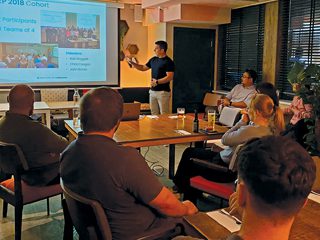
Institute News
Ahead of the next edition of the highly successful Young Engineer Programme (YEP), Young ICorr was hosting the YEP announcement event, which took place on 28th September, 2023, at the London Corner City Hotel and was organised by the Young ICorr Industry Representative, Izabela Gajewska, and the Young ICorr Chair, Dr. James McGladdery. The event attendees could learn about the history of YEP from Dr. Anthony Setiadi, who was actively involved in organising previous YEP editions, meet previous YEP participants, including the winners of previous YEP editions, and hear about reflections, learnings, and the approach to solving the programme’s case study from the winner of the 2018 YEP edition and current Chair of the ICorr Corrosion Engineering Division, Dr. Danny Burkle, as well as the winner of the 2020 YEP and the Young ICorr member, Praveena Nanthakumaran. The event provided a great opportunity for networking and finding out more about the YEP 2024 syllabus.
The Institute of Corrosion’s Young Engineer’s Programme is a best-in-class training course aimed at engineers, scientists, and technicians in their early career stages looking to enhance their skills in the field of corrosion.
YEP 2024 will be based in London, UK, although open to all able to travel and consist of monthly evening lectures from January to October. Delegates will also participate in a team-based case study that will test their acquired technical knowledge throughout the programme. The case study will be presented in November as a team in front of a panel of experienced judges with the opportunity to win an all-expenses-paid trip to the USA.
The objectives of the YEP programme are to:
• Introduce the fundamental topics of corrosion and materials,
• Broaden the participants’ views and knowledge by passing on some of the experiences from the more established members,
• Create a network of younger engineers and establish contact points,
• Facilitate the integration between younger and senior ICorr members, and
• Support young engineers with their Continuing Professional Development (CPD).
For more information about the Young Engineer Programme, please head to: www.icorr.org/young_engineer_programme

